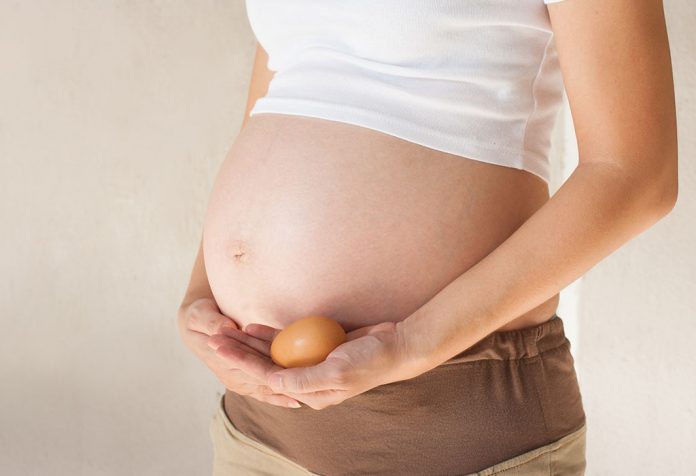How Often Should I Eat Eggs While Pregnant


At FirstCry Parenting, our aim is to give you the most elevant, accurate and up to date information.
Every article that we publish, confirms to stringent guidelines & involves several levels of reviews, both from our Editorial team & Experts. We welcome your suggestions in making this platform more useful for all our users. Write in to us at parenting.care@firstcry.com

- Can Pregnant Women Eat Eggs?
- Benefits of Eating Eggs
- Risks of Eating Eggs During Pregnancy
- How Many Eggs Can a Pregnant Woman Eat?
- How to Select The Right Egg
- What is the Correct Way to Store Eggs?
- How to Cook Eggs
- How Long Do Eggs Last?
- Suggestions to Avoid Bacterial Infections Through Egg Consumption
Last Updated on
A woman's diet during pregnancy needs to be taken special care of, as it has a direct impact on the development of the baby. Eating nutritious food is important for the well-being of the mother as well as the child. Eggs are full of protein and other nutrients, and are usually a great food to include in people's diet. However, is it safe for pregnant women? Let us understand the benefits that eggs can have during pregnancy, as well as any side-effects that could occur.
Can Pregnant Women Eat Eggs?
"Is it okay to eat eggs during pregnancy?", a lot of moms-to-be may wonder. While the answer to this question is yes, there are certain precautions which need to be taken before consuming eggs. Eggs are filled with minerals, vitamins, and good fat. Eating eggs in pregnancy will supply all these essential nutrients to the mother and the baby. Instead of eating raw or unboiled eggs, it is advised to eat boiled eggs during pregnancy, as this will eliminate any harmful bacteria that is present in the egg. Certain precautions when buying eggs, such as ensuring its freshness by checking the packaging date and buying them only from clean places will reduce the chances of contamination.
Benefits of Eating Eggs
Eggs are power-packed food items and a rich source of essential nutrients. The points listed below highlight the importance of eating eggs during pregnancy:

1. High Protein Content
Proteins are building blocks of the cell and assist in the development of the baby. Eating an appropriate amount of eggs will provide the baby with the necessary amount of protein to augment healthy growth.
2. Brain Development
Eggs contain choline, which is important for the growth and overall development of the brain. It prevents the baby from developing diseases like spina bifida and anencephaly.
3. Good Calorie Intake
Each egg contains about 70 calories and helps fulfil a part of the daily calorie requirement necessary for the baby and the mother to have good growth.
4. Helps to Regulate Cholesterol
Consumption of eggs will help to balance cholesterol deposits in the body. However, women should stick to egg whites and avoid eating egg yolks during pregnancy if they already have cholesterol issues.
5. Rich in Vitamins A, D, E, K
Eggs contain these four fat-soluble vitamins, especially vitamin A. Vitamin A is an essential nutrient. It helps in normal growth and development during pregnancy, including the developing lungs, kidneys, heart, eyes, and other organs of the fetus
6. Other Nutrients
Eggs are rich in antioxidants like lutein and zeaxanthin, which are important for eye and vision development. In addition, eggs also provide essential vitamins like Vitamin D, Vitamin B12, and Vitamin B2.
Risks of Eating Eggs During Pregnancy
While the egg is a rich source of nutrients to the pregnant women, it also has risks associated with it especially if not consumed correctly
1.Salmonella Poisoning
Raw, uncooked eggs can be host to a disease-causing bacteria called salmonella. This bacteria can cause food poisoning, which will lead to vomiting, diarrhoea, high fever, headache, abdominal pain, and dehydration. In some cases, these symptoms can be serious enough to cause preterm labour or even miscarriage. This condition is known as salmonella poisoning.
2.Other Risks
Consumption of egg yolk can also lead to difficulties in case the pregnant woman already has high cholesterol levels. Consumption of eggs can also cause allergies such as skin rashes, nasal congestion, hives and other problems.
How Many Eggs Can a Pregnant Woman Eat?
The suggested egg intake ranges from one to two eggs daily, depending on your cholesterol level. Each egg contains about 185mg cholesterol and the body needs around 300 mg daily. Eating eggs every day if one has high cholesterol can increase complications and should be avoided. The number of eggs to be consumed daily should be based on the cholesterol content in the remainder of your diet. To be on the safer side, the consumption of egg yolk should be limited to less than twenty eggs in a month. Most doctors recommend that pregnant women stick to only consuming egg whites.
How to Select The Right Egg
While picking up eggs, one needs to be sure that the egg is stored in a hygienic place and is not prone to contamination. Most countries will have a certification mark on the eggs certifying them to be fit for consumption and free of any bacteria. Even while buying other food items, one should make sure to avoid items that are egg-based, as the source of these eggs can't be verified.
What is the Correct Way to Store Eggs?
In order to keep the eggs free from salmonella bacteria, it is important to store them properly.
- Always keep the eggs in a fridge, as it minimises the chances of spoilage.
- Keep the eggs away from other food items and store them in a tray or the box other than the one in which they came in.
- It is advisable to consume boiled eggs within three days.
- Avoid using eggs with damaged shells, as they might contain dirt and bacteria.
- Ensure that the eggs have not crossed their shelf life.
How to Cook Eggs
Cooking eggs during pregnancy is pretty much the same as when one is not pregnant. The idea here is to ensure that the salmonella bacteria are killed in the cooking process:

In order to cook an egg, take an egg and boil it for about for five to seven minutes. You can also fry the egg on both sides until the white is no longer translucent. The yolk should become completely solid. This process takes approximately five minutes. One should take special precaution while eating food that contains eggs and is not cooked at home.
How Long Do Eggs Last?
An egg is best consumed 28 days from the day it was laid. Boiled eggs should be consumed within two to three days after boiling, and food containing egg should be consumed immediately.
Suggestions to Avoid Bacterial Infections Through Egg Consumption
- Handle the eggs with clean hands that are thoroughly washed.
- Do not splash raw egg over other utensils or food items.
- Use utensils which have been cleaned with hot, soapy water.
- Do not place eggs with other foods, irrespective of whether they are cracked or not.
- Clean the utensils, surroundings/kitchen platform thoroughly with warm, soapy water after cooking is completed.
An easily –available source of protein, eggs are a great addition to a pregnancy diet. Include them in your meals, keeping in mind the above points and make the most of their nutritious value.
How Often Should I Eat Eggs While Pregnant
Source: https://parenting.firstcry.com/articles/eating-eggs-during-pregnancy/